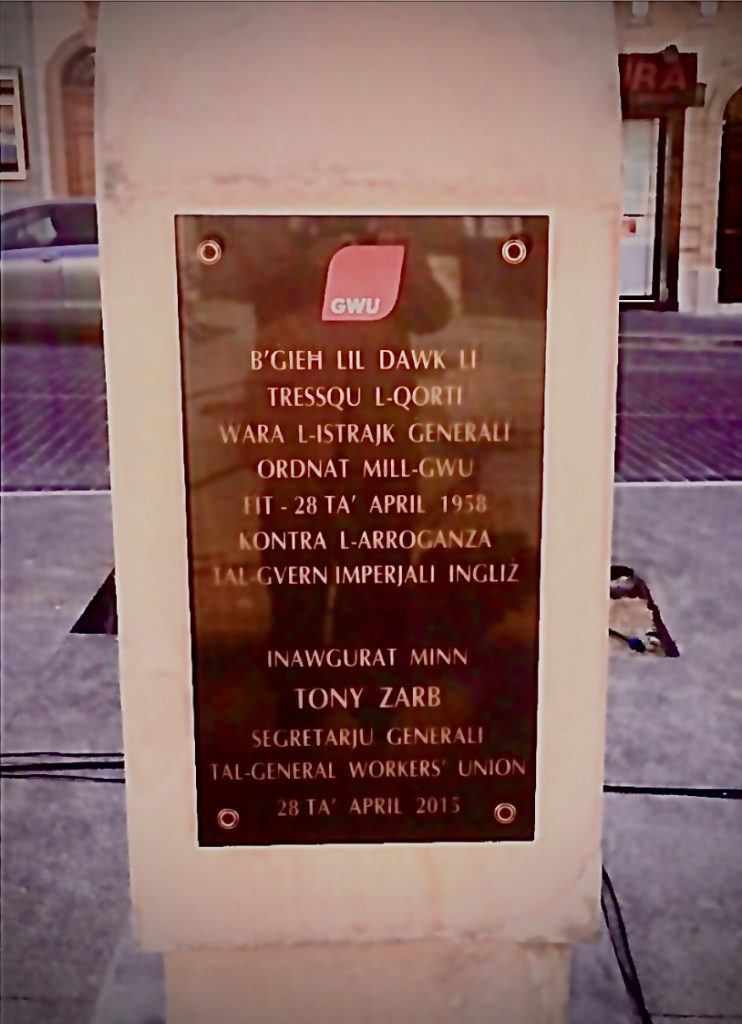The next few days will mark the 63rd anniversary of the General Strike of April 28, 1958. It was the National Council of the GWU that decided at a meeting on 25 April 1958 that the GWU should call a general strike three days later for 28 April.

On the day of the strike, it looked from early morning as if the workers would answer the GWU’s call in full force, and that when the country awoke as if paralysed. It was the workers and many young people who showed a determination, who without fear and with great militancy in them, took to the streets all over Malta to protest.
It was a day when the workers dominated the day under the leadership of the GWU and even with the help of the Labour Party. At this time the workers were determined to send a clear message to the British rulers that their time in Malta was about to begin. During the day the workers faced the wrath of the police who at this time said that they would unite the Queen, but the workers were not afraid of the wrath of the Law Enforcement.
The strike led to the arrest of many workers and officers, but not only, for a number of them were also thrown into prison. It is worth noting that 28 April 1958 was a black day for Malta. For the workers and the GWU it was not, because on that day the worker showed his strength, and it was the beginning of the liberation from the chains of the foreigner.
To commemorate the strike of 28 April and especially all those who were arrested and jailed, the GWU unveiled a memorial at Paola Square on Thursday 28 April 2015. This was one of the places where the riots took place and this memorial was erected to commemorate this glorious event for the GWU and the workers which was a black day for others.
The Pensioners Association salutes that these heroes are both those who are now dead and those who are still alive and who are now pensioners for the courage they showed. The Pensioners’ Association calls for this anniversary to be commemorated every year.

The Interdict and the GWU
A few days ago, the 60th anniversary of the Interdict was issued by the Maltese Church led by Archbishop Mikiel Gonzi. The aim was to prevent the Labour Party from being in government. This was a black episode for the Maltese Church and for Malta where many people of the Labour faith had to go through a complete ordeal. Several members of the National Council and members of various GWU section boards were banned.
Tony Zarb, former General Secretary, tells us that at the first meeting he had with former General Secretary Joe Attard Kingswell, shortly after Tony became General Secretary, Kingswell had told him, among many other things, that at the time of the Interdict he had sent the – Archbishop Gonzi – after him where he was told that he was going to issue the Interdict on GWU newspapers. Zarb relates that Kingswell told him he knew in advance why Archbishop Gonzi would send for him, and so he had gone prepared.
When the Archbishop told Kingswell what he intended to do, he took from a large envelope the workbooks of the labourers who worked in the Union Printing Office, and said to Gonzi: “The remission of the interdict is your prerogative, but by this decision you will have to bear the responsibility for the loss of the labour of these workers, with consequences for their families.”
The result of the deft move by the Secretary-General Joe Attard Kingswell at the time was that Gonzi resigned, and no interdict was published in the Union newspapers. These events should be remembered so that such dark times never happen again in Malta.

Name and shame
After drawing attention to the irresponsible treatment of pensioners by banks in recent weeks, the Pensioners’ Association feels that the authorities do not seem to notice the inhuman action of banks against pensioners.
Several members complain about the way they are being treated by the banks. Under these circumstances, the association will not hesitate to convey the grievances of its members through a name-and-shame campaign.
It is not acceptable for pensioners to go to the BOV branch of Fleur de Lys to cash the check and after queuing they are served and told that they cannot cash the check there but have to go to the BOV branch of Fleur de Lys. Birkirkara’.
It is not acceptable that at the BOV branch of Zurrieq pensioners go to cash their pension check for less than €700 and are told that they cannot cash it.
These are unacceptable situations. The Pensioners’ Association will continue to call on the authorities to take immediate steps to put an end to this abuse by banks against pensioners. The association will continue to insist, even though it knows that it will stand alone in this matter as it is today.
The Pensioners Association, while appealing to its members to continue to send their complaints, reminds them that there should be mutual cooperation between them as customers and workers. These workers want to follow what is decided by the leaders of the banks about whom the question arises that they seem to enjoy what is happening to see the pensioners and the people in general suffer. Who knows?







